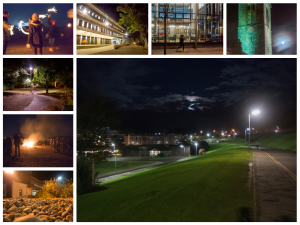Distinguished lecture 2014
The first of this academic year’s distinguished lectures will be given by Prof Luca Cardelli of Microsoft Research and the University of Oxford, 0930–1600 on Tuesday 25 November in Lower College Hall.
Event details
- When: 25th November 2014 09:15 - 16:00
- Where: Lower College Hall
- Series: Distinguished Lectures Series
- Format: Distinguished lecture, Lecture
Lectureship in Computer Science
We seek applications for a lectureship in Computer Science. We welcome applications from excellent researchers who are keen to cooperate with others within the School and in other Schools of the University. While exceptional individuals in all areas will be considered, we are especially interested in the broad area of data-intensive research, with emphasis on data science, machine learning, data management, data mining, open science, and sensing and sensor interpretation. Specifically, we are interested in appointing someone who would actively contribute to and collaborate widely within, the recently launched Institute for Data Intensive Research, developing and applying cutting edge Computer Science techniques for applications in a wide range of research areas.
You should have a PhD, a period of postdoctoral experience and an outstanding research record as demonstrated by publications and research funding. You must be willing to cooperate with other researchers across the School and University and to teach in any area of Computer Science. Teaching is important to us and you should be a committed teacher, with appropriate experience.
Candidates interested in this post are welcome to informally contact the Head of School (Steve Linton hos-cs@st-andrews.ac.uk) to discuss possible options. For informal discussion on IDIR, please contact Professor Simon Dobson simon.dobson@st-andrews.ac.uk. We would welcome interaction with any established groups wishing to move to St Andrews.
Information on how to apply.
Closing Date: 5 December 2014
Supporting the Design of Shape-Changing Interfaces by Jason Alexander, Lancaster University
Abstract:
Shape-changing interfaces physically mutate their visual display surface to better represent on-screen content, provide an additional information channel, and facilitate tangible interaction with digital content. The HCI community has recently shown increasing interest in this area, with their physical dynamicity fundamentally changing how we think about displays. This talk will describe our current work supporting the design and prototyping of shape-changing displays: understanding shape-changing application areas through public engagement brainstorming, characterising fundamental touch input actions, creating tools to support design, and demonstrating example implementations. It will end with a look at future challenges and directions for research.
Bio:
Jason is a lecturer in the School of Computing and Communications at Lancaster University. His primary research area is Human-Computer Interaction, with a particular interest in bridging the physical-digital divide using novel physical interaction devices and techniques. He was previously a post-doctoral researcher in the Bristol Interaction and Graphics (BIG) group at the University of Bristol. Before that he was a Ph.D. student in the HCI and Multimedia Lab at the University of Canterbury, New Zealand. More information can be found at http://www.scc.lancs.ac.uk/~jason/
This seminar is part of our ongoing series from researchers in HCI. See here for our current schedule.
Event details
- When: 11th November 2014 14:00 - 15:00
- Where: Cole 1.33a
- Format: Seminar
School Seminar: Complex Networks and Complex Processes
Simon Dobson, School of Computer Science, University of St Andrews
Abstract:
Complex networks provide a way of modelling systems with lots of
dependent elements, such as traffic networks or social networks. By
running processes over these networks we can explore how the topology of
the network affects the way the process evolves, and potentially
identify factors that accelerate or impede it. This opens-up
possibilities both for study (science) and control (engineering).
This talk will briefly introduce the mechanics of complex networks and
the processes that run on them, review some recent results we have
obtained, and look to future research programme where we will combine
simulation with sensing to give us new ways of looking at the world.
Event details
- When: 4th November 2014 14:00 - 15:00
- Where: Cole 1.33
- Series: School Seminar Series
- Format: Talk
Talk on complex networks
Simon Dobson will give a seminar on complex networks on Tuesday afternoon, 4 November, in the School of Computer Science.
Event details
- When: 4th November 2014 14:00 - 15:00
- Where: Cole 1.33
- Format: Seminar
Funded PhD Research Studentships
The School of Computer Science at the University of St Andrews has funding for students to undertake PhD research in any of the general research areas in the school:
http://www.cs.st-andrews.ac.uk/research
We are looking for highly motivated research students with an interest in these exciting research areas Our only requirements are that the proposed research would be good, we have staff to supervise it, and that you would be good at doing it. We have up to 6 funded studentships, including industrial sponsored studentships, available for students interested in working towards a PhD. The studentships offer costs of fees and an annual tax-free maintenance stipend of about £13,863 per year for 3.5 years. Exceptionally well qualified and able students may be awarded an enhanced stipend of an additional £2,000 per year. Students should normally have or expect at least an upper-2nd class Honours degree or Masters degree in Computer Science or a related discipline.
For further information on how to apply, see our postgraduate web pages (http://www.cs.st-andrews.ac.uk/prospective-pg). The closing date for applications is December 15th 2014 and we will make decisions on studentship allocation by February 27th 2015. Informal enquiries can be directed to pg-admin-cs@st-andrews.ac.uk or to potential supervisors.
Emotion Sense: From Design to Deployment by Neal Lathia, Cambridge University.
Abstract:
In the UK, more than 70% of mobile users now own a smartphone. These increasingly powerful, sensor-rich, and personal devices present an immense opportunity to monitor health-related behaviours and deliver digital behaviour-change interventions at unprecedented scale.
However, designing and building systems to measure and intervene on health behaviours presents a number of challenges. These range from balancing between energy efficiency and data granularity, translating between behavioural theory and design, making long psychological assessments usable for end users, and making sense of the sensor and survey data these apps collect in a multidisciplinary setting.
Approximately 18 months ago, we launched Emotion Sense, a mood-tracking app for Android where we tried to address some of these challenges. To date, the app has been downloaded over 35,000 times and has an active user base of about 2,000 people: in this talk, I will describe how we designed, trialled, and launched Emotion Sense, and the insights we are obtaining about diurnal patterns of activity and happiness that we are finding by mining the 100 million+ accelerometer samples the app has collected to date. I’ll close with future directions of this technology — including a novel smoking cessation intervention (Q Sense), and a generic platform (Easy M) that we have developed to allow researchers to conduct their own studies.
http://emotionsense.org/
http://www.qsense.phpc.cam.ac.uk/
http://www.cl.cam.ac.uk/~nkl25/easym/
Bio:
Neal is a Senior Research Associate in Cambridge University’s Computer Laboratory. His research to date falls somewhere in the intersection of data mining, mobile systems, ubiquitous/pervasive systems, and personalisation/ recommender systems, applied to a variety of contexts where we measure human behaviour by their digital footprints. He has a PhD in Computer Science from University College London. More info/contact http://www.cl.cam.ac.uk/~nkl25/
This seminar is part of our ongoing series from researchers in HCI. See here for our current schedule.
Event details
- When: 28th October 2014 14:00 - 15:00
- Where: Maths Theatre D
- Format: Seminar
The Design and Implementation of Feldspar
By: Josef Svenningsson, Chalmers University of Technology, Sweden
Feldspar is a domain specific language with the goal of raising the
level of abstraction for performance sensitive, low-level code.
Feldspar is a functional language embedded in Haskell, which offers a
high-level style of programming. The key to generating generating
efficient code from such descriptions is to use a high-level
optimisation technique called vector fusion. Feldspar achieves
vector fusion for free by employing a particular way of embedding the
language in Haskell by combining deep and shallow embeddings.
Bio: Josef Svenningsson is an Assistant Professor in the Functional
Programming group at Chalmers University of Technology. He has a broad
range of interest and has published papers on wide variety of topics,
including: program analysis, constraint solving, security, programming
language design, testing and high-performance computing.
Event details
- When: 21st October 2014 14:00 - 20th October 2014 15:00
- Where: Cole 1.33
- Series: School Seminar Series
- Format: Seminar
J.P. Morgan Code for Good 2014
J.P. Morgan Code for Good 2014: Applications Now Open
We are inviting talented technologists like you to join Code for Good 2014 in London, where you will compete in teams to code for a good cause over two days and one night. You will be challenged to use your vision, imagination and expertise as you creatively use technology to address a real challenge for a leading nonprofit organization.
At the J.P. Morgan Code for Good events, you will learn from the sharpest minds in the industry as you are joined by fellow technologists from across the U.K., as well as our own technology experts.
Event date: November 14-15, 2014
Application deadline: October 24, 2014
Prizes will be awarded to winning teams at the conclusion of the event. And remember, these competitions are the perfect opportunity for you to demonstrate your abilities to J.P. Morgan recruiters and technologists, who are actively involved with each event. Read more about previous winners and their work here.



